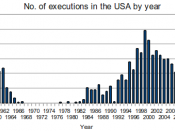As the war on crime continues, two truths hold steady: eliminating all crime is impossible, and controlling it is a must. The main weapon used to control crime in this war is deterrence. The government's deterrent for committing murder is the death penalty. The fear of death will not deter every person who contemplates murder from doing it. Whether it is for religious reasons and the hope of salvation or something else, stopping some people is not possible (Cohen 48). The intent is not to stop those people, but instead every other would-be killer. Capital Punishment has been in the national spotlight for many years and the center of the debate still remains whether it actually deters would be offenders. Does this age-old penalty for the ultimate sin achieve its goal? There are many lofty and rational arguments on both sides of this issue.
Advocates of the death penalty claim that the primary reason for this harsh punishment is that the fear of death discourages people from committing murder.
The main ways in which they support this theory are: the severity of the punishment, various polls of citizens and prisoners, and two in particular studies.
The most obvious deterring justification is the severity of punishment (Calebresi 19). This means, put simply, to punish for a crime in a way that the punishment outweighs the crime. If the punishment for robbing a bank is to spend one day in jail, then bank robbing would become a daily occurance. On the same note, if there is a reward for a lost item of jewelry and the reward is less than the selling price for that jewelry, the finder has no reason to bring it back. On the other hand, if the reward exceeds the value of the jewelry, the new owner will...


